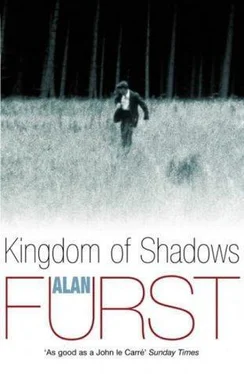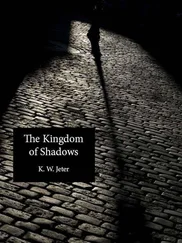Alan Furst - Kingdom of Shadows
Здесь есть возможность читать онлайн «Alan Furst - Kingdom of Shadows» весь текст электронной книги совершенно бесплатно (целиком полную версию без сокращений). В некоторых случаях можно слушать аудио, скачать через торрент в формате fb2 и присутствует краткое содержание. Жанр: Шпионский детектив, на английском языке. Описание произведения, (предисловие) а так же отзывы посетителей доступны на портале библиотеки ЛибКат.
- Название:Kingdom of Shadows
- Автор:
- Жанр:
- Год:неизвестен
- ISBN:нет данных
- Рейтинг книги:5 / 5. Голосов: 1
-
Избранное:Добавить в избранное
- Отзывы:
-
Ваша оценка:
- 100
- 1
- 2
- 3
- 4
- 5
Kingdom of Shadows: краткое содержание, описание и аннотация
Предлагаем к чтению аннотацию, описание, краткое содержание или предисловие (зависит от того, что написал сам автор книги «Kingdom of Shadows»). Если вы не нашли необходимую информацию о книге — напишите в комментариях, мы постараемся отыскать её.
Kingdom of Shadows — читать онлайн бесплатно полную книгу (весь текст) целиком
Ниже представлен текст книги, разбитый по страницам. Система сохранения места последней прочитанной страницы, позволяет с удобством читать онлайн бесплатно книгу «Kingdom of Shadows», без необходимости каждый раз заново искать на чём Вы остановились. Поставьте закладку, и сможете в любой момент перейти на страницу, на которой закончили чтение.
Интервал:
Закладка:
They nodded to the other couples, everyone smart in their jodhpurs and handmade boots, and trotted along at a good, stiff pace in the shade of the oak trees.
“I have a letter from Francesca,” Cara told him. “She says the house in Sussex is lovely, but small.”
“If you’d prefer something grand, we’ll go up to the baroness’s place.”
“That’s what you’d like, right, Nicky?”
“Well,” Morath said. He really didn’t care but pretended in order to please Cara. “Maybe Normandy’s better. Cool at night, and I like to swim in the sea.”
“Good. I’ll write this afternoon. We can see Francesca when she comes in the fall. For the clothes.”
Boris Balki telephoned and asked him to come to the nightclub. The Balalaika was closed for the August vacation, the tables covered with old bedsheets. There was no beer to drink, so Balki opened a bottle of wine. “They won’t miss it,” he said. Then, “So, you must be leaving soon.”
“A few days. The great migration.”
“Where do you go?”
“Normandy. Just outside Deauville.”
“That must be nice.”
“It’s all right.”
“I like the time off,” Balki said. “We have to paint, fix the place up, but at least I don’t have to make jokes.” He reached in a pocket, unfolded a page of cheap writing paper covered with small Cyrillic characters. “It’s from a friend of mine, in Budapest. He writes from Matyas Street.”
“Not much there. The prison.”
From Balki, a grim smile.
“Oh.”
“He’s an old friend, from Odessa. I thought, maybe, if somebody knew somebody …”
“Matyas is the worst-in Budapest, anyhow.”
“He says that, as much as he can get it past the censor.”
“Is he in for a long time?”
“Forty months.”
“Long enough. What’d he do?”
“Bonds.”
“Hungarian?”
“Russian. Railroad bonds. The 1916 kind.”
“Somebody buys that?”
Balki nodded, then, despite himself, started laughing. “Poor Rashkow. He’s tiny. ‘Look at me,’ he used to say. ‘If I tried to hold somebody up they’d stuff me in a drawer.’ So he sells things. Sometimes jewelry, sometimes paintings, even manuscripts. Tolstoy! His unfinished novel! But, lately, it’s railroad bonds.”
They both laughed.
“You see why I love him,” Balki said.
“They’re not actually worth anything, are they?”
“Well, Rashkow would say, not now. But think of the future. ‘I sell hope,’ he used to say. ‘Hope for tomorrow. Think how important that is, hope for tomorrow.’ “
“Boris,” Morath said, “I’m not sure I can help.”
“Well, anyhow, you’ll try.” The after all, I tried for you was unspoken but not difficult to hear.
“Of course.”
“Before you go away?”
“Even if I can’t do that, I won’t wait for September. They have telephones in Deauville.”
“Semyon Rashkow.” Balki held the letter up to the light and squinted. Morath realized he needed glasses. “Number 3352-18.”
“Just out of curiosity, who wrote Tolstoy’s unfinished novel?”
Balki grinned. “Wasn’t bad, Morath. Really. It wasn’t.”
The last place he wanted to be, in Colonel Sombor’s office on the top floor of the Hungarian legation. Sombor sat erect at his desk, reading a dossier, using the end of a pencil to guide his eyes along a type-written line. Morath stared out the open window. Down below, in the garden, a porter, an old man in a gray uniform and a gray peaked cap, was raking the gravel. The sound was sharp in the silent courtyard.
He had to help; he felt he had to help. Balki wasn’t an affable barman, Balki was him, Morath, just in the wrong country, in the wrong year, forced to live the wrong life. A man who hated having to be grateful for a job he hated.
Morath had tried his uncle first, was told he was not in Paris, then reached Sombor at his office. “Of course, come tomorrow morning.” Sombor was the man who could help, so Morath went to see him, knowing it was a mistake every step of the way. Sombor had a title, something innocuous, but he worked for the secret police, and everybody knew it. There was an official spy at the legation, Major Fekaj, the military attache, and there was Sombor.
“I don’t see you enough,” he complained to Morath, closing the dossier. Morath found it hard to look at him. He was one of those people whose hair looks like a hat-a polished, glossy black hat-and with his sharp, slanted eyebrows, he suggested a tenor made up to play the devil in a comic opera.
“My uncle keeps me busy.”
Sombor acknowledged Polanyi’s position with a gracious nod. Morath certainly wanted it to be gracious.
“Yes, I can believe it,” Somber said. “Also, I’m sure, this wonderful city. And its opportunities.”
“That too.”
Sombor touched his lips with his tongue, leaned forward, lowered his voice. “We’re grateful, of course.”
From a man who’d been forced, in 1937, to remove a portrait of Julius Gombos from his wall-Gombos was widely credited with having invented the philosophies of Adolf Hitler-not necessarily what Morath wanted to hear. “Good of you to say it.” Grateful for what?
“Not the kind of thing you can allow,” Sombor said.
Morath nodded. What in hell’s name had Polanyi told this man? And why? For his own good? Morath’s? Some other reason? What he did know was that this conversation was not, not if he could help it, going to turn frank and open.
“Someone who has done a favor for me, for us”-Morath smiled, so did Sombor-“needs a favor in return.”
“Favors …”
“Well, what is one to do.”
“Quite.”
A contest of silence. Sombor ended it. “So, exactly what sort of favor are we talking about?”
“An old friend. Locked up in Matyas.”
“For?”
“Selling worthless bonds.”
“ Beszivargo? ” Infiltrator. Which meant, for Sombor and others, Jew.
Morath thought it over. Rashkow? “I don’t think so,” he said. “Not from the name.”
“Which is?”
“Rashkow.”
Sombor took a tablet of white paper and unscrewed the cap of his pen and carefully wrote the name down on the paper.
The month in the country gathered momentum, preparation on the avenue Bourdonnais proceeded at a fever pitch. The baroness had been written, then telephoned, then telephoned again. Cara’s MG had been washed, waxed, and filled with water, oil, and gasoline, the seats rubbed with saddle soap, the walnut dashboard polished to a soft glow. The picnic hamper was ordered from Pantagruel, then Delbard, then Fauchon. Did Morath like sliced beef tongue in aspic? No? Why not? The tiny folding table purchased, taken back to the store, replaced with a green horse blanket, then a fine wool blanket, brown with a gray stripe, which could also be used on the beach. Cara brought home a bathing suit this little, then this little, and then this little; the last one springing a seam as Morath whipped it off. And she should be damned glad, he thought, that there weren’t toothmarks in it-take that back to Mademoiselle Ninette on the rue Saint-Honore.
Saturday morning, Morath had a long list of errands, carefully saved up as a pretext to escape from Cara’s packing. He stopped at Courtmain, at the bank, at the tabac, at the bookstore, where he bought Freya Stark’s The Valleys of the Assassins and Hemingway’s A Farewell to Arms, both in French translation. He already had a Gyula Krudy novel. Krudy was in essence the Hungarian Proust-“Autumn and Budapest were born of the same mother”-and Morath had always liked him. In fact, the baroness’s houses were stacked to the ceilings with books, and Morath knew he would fall in love with some exotic lost masterpiece and never turn a page of whatever he’d brought with him.
Читать дальшеИнтервал:
Закладка:
Похожие книги на «Kingdom of Shadows»
Представляем Вашему вниманию похожие книги на «Kingdom of Shadows» списком для выбора. Мы отобрали схожую по названию и смыслу литературу в надежде предоставить читателям больше вариантов отыскать новые, интересные, ещё непрочитанные произведения.
Обсуждение, отзывы о книге «Kingdom of Shadows» и просто собственные мнения читателей. Оставьте ваши комментарии, напишите, что Вы думаете о произведении, его смысле или главных героях. Укажите что конкретно понравилось, а что нет, и почему Вы так считаете.












